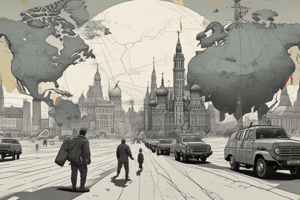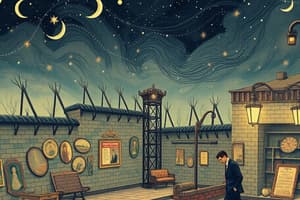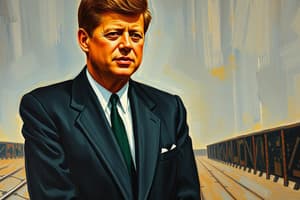Podcast
Questions and Answers
What was the main goal of the Freedom Riders?
What was the main goal of the Freedom Riders?
- To promote violent riots against racial discrimination
- To advocate for the Nation of Islam's teachings
- To challenge segregation laws through nonviolent protests (correct)
- To establish the Black Panther Party
What was the significance of the Civil Rights Act of 1964?
What was the significance of the Civil Rights Act of 1964?
- It established the Black Panther Party
- It promoted the Nation of Islam's ideology
- It outlawed discrimination based on race (correct)
- It led to the assassination of Martin Luther King Jr.
What was the significance of the Freedom Summer?
What was the significance of the Freedom Summer?
- It marked the beginning of the Black Panther Party
- It showed the dangers that activists faced (correct)
- It led to the passage of the Voting Rights Act
- It was a summer of nonviolent protests
What was the primary goal of the Area Redevelopment Act?
What was the primary goal of the Area Redevelopment Act?
What was the main objective of the Voting Rights Act of 1965?
What was the main objective of the Voting Rights Act of 1965?
What was the primary motivation behind the Limited Nuclear Test Ban Treaty?
What was the primary motivation behind the Limited Nuclear Test Ban Treaty?
Who was responsible for the assassination of Martin Luther King Jr.?
Who was responsible for the assassination of Martin Luther King Jr.?
What was the primary difference between Medicare and Medicaid?
What was the primary difference between Medicare and Medicaid?
What was the main goal of the Black Panther Party?
What was the main goal of the Black Panther Party?
What was the primary goal of the War on Poverty?
What was the primary goal of the War on Poverty?
What was the primary focus of President Johnson's presidency?
What was the primary focus of President Johnson's presidency?
What was the primary goal of the Bay of Pigs invasion?
What was the primary goal of the Bay of Pigs invasion?
Flashcards are hidden until you start studying
Study Notes
1960 Election
- The presidential candidates were John F. Kennedy and Richard Nixon.
Presidential Term Limit
- The 22nd Amendment established a limit of two terms for a president.
Flexible Response
- Kennedy's Flexible Response was a military strategy to combat communism.
Bay of Pigs
- The Bay of Pigs was a failed CIA-led invasion of Cuba in 1961.
Key Figures
- Fidel Castro was the Cuban revolutionary leader and dictator.
- Nikita Khrushchev was the Soviet Union leader during the Cold War.
Limited Nuclear Test Ban Treaty
- The treaty prohibited nuclear testing in the atmosphere.
Kennedy's Popularity
- Young adults were inspired by Kennedy's leadership and vision.
Kennedy's New Frontier
- The New Frontier was Kennedy's vision for progress and change in America.
Area Redevelopment Act
- The act aimed to stimulate economic growth in underdeveloped areas.
Kennedy's Assassination
- President Kennedy was assassinated in Dallas, Texas, in 1963.
- Lee Harvey Oswald was accused of his assassination.
Warren Commission
- The Warren Commission investigated Kennedy's assassination.
Johnson's Presidency
- Johnson focused more on social issues than Kennedy.
War on Poverty
- The War on Poverty aimed to eliminate poverty in America.
Great Society
- The Great Society was Johnson's vision for a more equitable society.
Medicare and Medicaid
- Medicare was established for seniors, while Medicaid was for the poor.
Decline of the Great Society
- The Great Society declined due to cost and social changes.
Civil Rights Organizations
- The Southern Christian Leadership was led by Martin Luther King Jr.
- The Student Nonviolent Coordinating Committee advocated for civil rights using nonviolence.
- The Congress of Racial Equality fought against racial discrimination.
Freedom Riders
- The Freedom Riders were protesters who challenged segregation laws.
- They faced violent attacks in Alabama.
University of Mississippi Integration
- Riots ensued over integration at the University of Mississippi in September 1962.
"I Have a Dream" Speech
- Martin Luther King Jr. delivered the "I Have a Dream" speech, emphasizing equality.
Civil Rights Act of 1964
- The act outlawed discrimination based on race.
Voter Registration in Mississippi
- Voter registration in Mississippi was crucial for empowering African American voters.
Robert Moses
- Robert Moses was a civil rights activist and organizer who played a key role in voter registration.
Freedom Summer
- The Freedom Summer showed the dangers activists faced in their fight for civil rights.
Civil Rights Workers' Murders
- Andrew Goodman, James Chaney, and Michael Schwerner were civil rights workers murdered in 1964.
Voting Rights Act of 1965
- The act was passed to protect minority voting rights.
"Nonviolent" Approach to Civil Rights
- Some people questioned the "nonviolent" approach, urging more direct action for change.
Militants
- Militants advocated for black rights using force if necessary.
Nation of Islam (Black Muslims)
- The Nation of Islam taught black nationalism and self-reliance.
Elijah Muhammad and Malcolm X
- Elijah Muhammad was the leader of the Nation of Islam, and Malcolm X was a prominent civil rights leader who was assassinated in 1965.
Black Panther Party
- The Black Panther Party advocated for civil rights and anti-war activism.
Martin Luther King Jr.'s Assassination
- Martin Luther King Jr. was assassinated in 1968.
- James Earl Ray was responsible for his assassination.
Assassination's Impact on Civil Rights
- The assassination led to increased activism and unrest among Civil Rights activists.
Resurrection City
- Resurrection City was a protest camp for economic justice.
White Americans' Views on Civil Rights
- Some white Americans supported the Civil Rights movement, while others resisted.
Busing System
- The Busing System was used to integrate schools and achieve racial integration.
Affirmative Action
- Affirmative Action policies aimed to promote equality.
Barack Obama
- Barack Obama is the 44th President of the United States.
Vietnam
- France controlled Vietnam in the mid-1800s.
- Japan controlled Vietnam from the early to mid-20th century.
Ho Chi Minh
- Ho Chi Minh was a Vietnamese revolutionary leader, and his name means "Bringer of Light."
Domino Theory
- The Domino Theory posited that if one country fell to communism, others would follow.
Studying That Suits You
Use AI to generate personalized quizzes and flashcards to suit your learning preferences.




